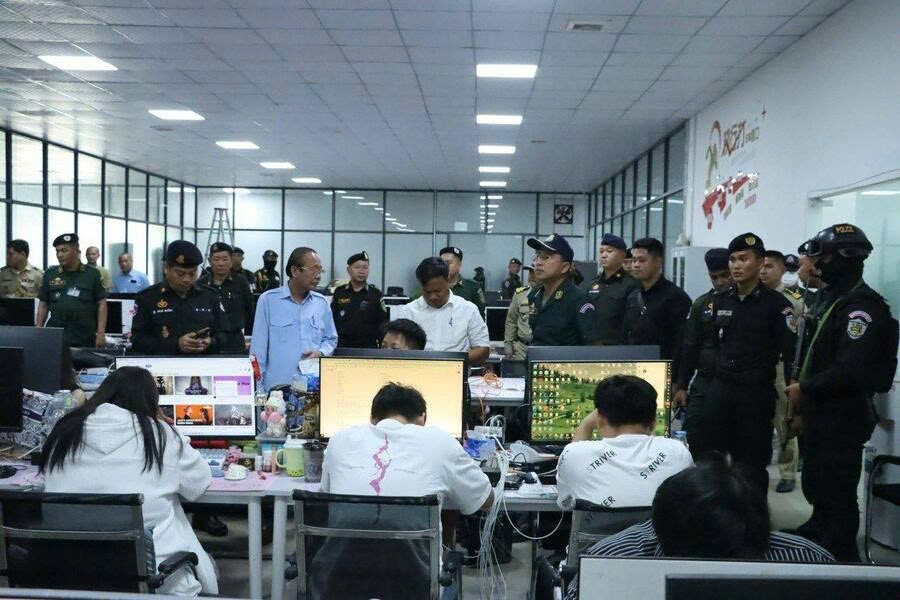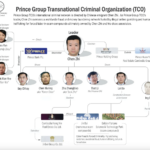At just 17, Poom-Jai vividly recalls the work he was forced to do. For months, the Thai teenager was trained to lure, befriend, and defraud vulnerable individuals online. “I often wondered if my victims would end up penniless or face hardships because of me,” he confessed.
Scam compounds—similar to the one where Poom-Jai worked—are hidden within heavily guarded and secretive complexes scattered across Southeast Asia. In these remote locations, the online scam industry is booming.
Inside, thousands of operatives are trained to steal money from millions of victims worldwide.
In 2024, Sky News secretly infiltrated one such scam center in Cambodia, exposing the grim reality of life for thousands of workers like Poom-Jai, who find themselves trapped in a criminal network they cannot escape.
The Pig Butchering Scheme
The scams Poom-Jai participated in are known as “pig butchering.” Victims, or “pigs,” are lured into investing money into fraudulent schemes until they are “fat enough” to be “slaughtered.” Essentially, scammers wait until victims have invested all they can before stealing everything.
Scammers are trained to build trust, but everything they say is a lie. They use fake names, create false profiles, and fabricate stories. “They fell in love with me,” Poom-Jai said of his victims, his face almost expressionless as he described the process.
It’s all part of a meticulously scripted playbook orchestrated by a team, waiting to see who takes the bait. But Poom-Jai isn’t the villain in this story. Like many working in these scam centers, he too is a victim.
He traveled to Cambodia, leaving behind family and friends, after a romantic scammer promised him a well-paid administrative job. Instead, he found himself with no choice but to start scamming others.
Like many others, lured by false promises and then threatened with violence, Poom-Jai’s life revolved around the scam center—working, eating, and sleeping there, often unable to leave without permission. Notably, these complexes are always located in rural areas, kilometers away from cities.
Moved between buildings, Poom-Jai became so desperate that he nearly died trying to escape.

Cambodian authorities arrest suspects linked to online scams – Illustrative image: Cambodian Ministry of Information
‘They Brought Out the Stun Batons’
Workers in many scam centers in Bavet, Cambodia, come from all over the world. Some willingly join to make money, while others are trafficked, trapped in modern slavery, and tortured for failing to meet targets.
In the last building where Poom-Jai worked, his boss accused him of stealing. “They kicked and punched me,” he recalled. “I told them I didn’t steal, but no one believed me. Then, they brought out the stun batons.”
Days later, he removed an iron railing from a window and jumped from the 8th floor to another building. After the fall, he severely sprained his leg and was hospitalized. Thanks to a doctor who helped him escape from the criminal boss, he survived and returned to Thailand.
“This is the worst human trafficking crisis in history,” said Judah Tana, an Australian rescue worker, referring to the horrors of this scam industry. Judah leads Global Advance Projects, a charity that has helped around 700 people escape scam centers.
Judah’s phone never stops ringing. He’s constantly negotiating with victims, embassies, and militias controlling these areas. He’s witnessed massive scam centers glowing with lights along the border.
Those who escape describe the centers as “hell on earth.” Judah’s small team has handled around 100 cases. And if a victim’s family can’t pay the £8,000 ransom (approximately 280 million VND), “you’ll be stuck there forever.”
For some, this work can cost their lives. In Thailand, Chatphisit Jitprasert reported that his brother, Thapakorn, died after falling from a building in Poipet.
After everything he’s been through, he can only say: “Don’t go there.”
Yet people still do, and the industry is growing rapidly. The UN and other agencies estimate that online scams, mostly originating from Southeast Asia, generate billions of dollars annually for international criminal gangs. Cybercriminals pose as friends or offer fake investment opportunities to defraud targets worldwide.
Names in this article have been changed
Exposing Myanmar’s “Scam City”: Starlink Blankets Rooftops as 100,000 Enslaved Workers Remain Trapped
Myanmar’s military junta has launched a surprise raid on a notorious scam center, seizing 30 Starlink devices allegedly used to maintain a cross-border criminal network despite ongoing crackdowns.
$15 Billion in Bitcoin Seized from Massive Cambodian Fraud Scheme
The U.S. Department of Justice (DOJ) has executed the largest asset seizure in history, confiscating approximately $15 billion in Bitcoin from the cryptocurrency wallets of a man operating a global “pig butchering” scam based in Cambodia, prosecutors announced on Tuesday.










































